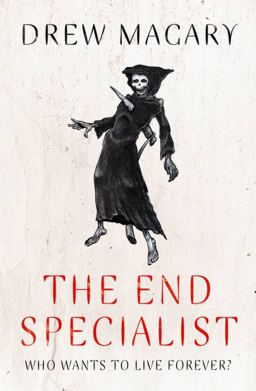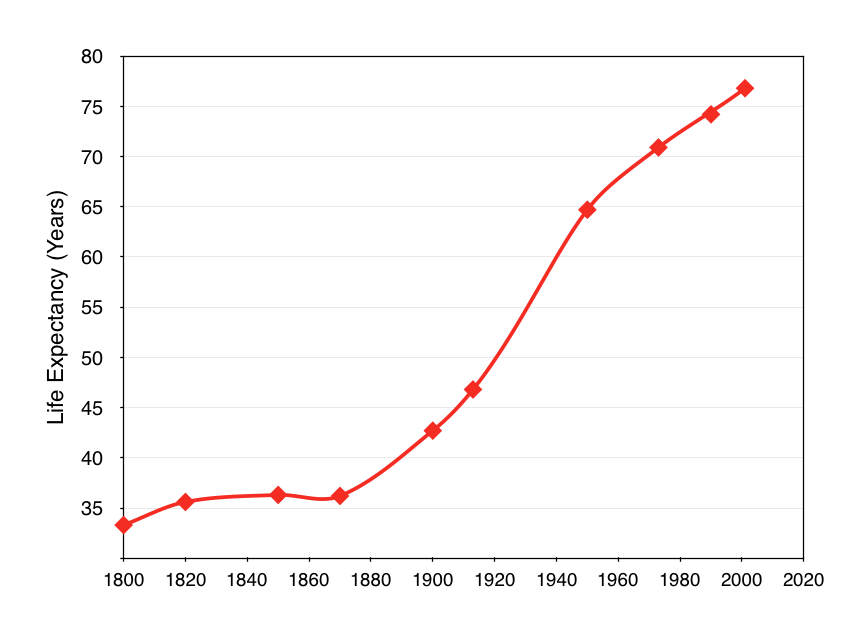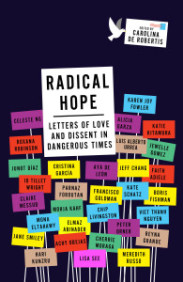I’m just coming to the end of reading the End Specialist by Drew Magary, a story about a fictional cure for ageing and its consequences. It is a different style of book from my usual read, the story is told through a series of blog entries made by the protagonist, I chose it based on reviews and was intrigued by how it would address the subject matter. A lot of the story revolves around the philosophical and psychologist impacts of a cure for ageing. The author details how the cure is initially a blackmarket product with governments not willing to legalise it, then inevitably its eventual consumerism is brought about peer pressure. With that comes activists, the “organics” and “greenies” who don’t believe the cure should happen, and that “we are what we are”. This leads to terrorism – the killing of those that can no longer age. As the story progresses the world has to deal with the increased number of people and psychological impact that never ageing has on a person.
 Front Cover of “The End Specialist”
Front Cover of “The End Specialist”
Reading a book like this can make you think about what living forever would actually mean, it made me realise that there are issues you would have to deal with that you might not have thought about, I’m not going to say too much – spoilers!. This story made me realise that our own mortality is a good driver to make us achieve more, if I could live forever I would probably procrastinate and never ever go out and think about doing my bucket list. Would people be less inclined to go out and take on new experiences if life went on forever? This thought also, for what ever reason, made me remember the Queen song and Freddie Mercury’s words – “Who wants to live for ever?”. But likewise there have been those who have searched for the holy grail in the hopes of obtaining ever lasting life.
A cure for ageing not for deathOne of things the book subtly addressed is the fact that the cure isn’t a cure for death. This is a headline I see regularly now in sensationalist news articles related to research into ageing. It is whats bugs me most at the moment in science, dramatic headlines that are factually incorrect, all to sell a new item. The Daily Star in the UK for instance had a headline: “Want to live forever? Scientists are on the brink of a cure for DEATH”. A cure for death is not realistic, at least not in the foreseeable future. To cure death, we’d have to have a cure for every disease, every illness that can afflict us, and we’d have to somehow prevent any injury or accident causing death.
Is death the endThere has been some interesting work by researchers at Washington State University who have shown that many genes stay active after death, some for up to 4 days, so at least for now we know our cells don’t shut down at the moment of death. This even lends a really tiny bit of credulity to indicate there might be some science in the undead stories we see in so many sci-fi and horror shows these days. Maybe one day nanotechnology can address this but that is a long, long way off, and we will always have the problem that after our brain is starved of oxygen for more than 6 minutes, we suffer irreparable brain damage.
How could we slow down ageing?In the End Specialist a single gene seems to be responsible for completely halting the ageing process and whilst this can’t be ruled out as a possible cure for ageing the current evidence makes this unlikely. There have been lots of individual genes or proteins found that can have a profound effect on slowing ageing, but none of them are 100%, they only slow the process down. A main focus of research has targeted telomeres. It has been shown that as cells divide their telomeres shorten until eventually the cell dies, in humans thats around 40 – 60 cell divisions. Research has shown that by making telomeres long again, the ageing process can be slowed. The only problem is no one has yet worked out how to do this in humans. This is further confounded because even though the cells can continue to divide, they will still pick up errors. Although our cells have mechanisms to correct errors, this isn’t 100% foolproof, so the longer we make a cell divide the more chance a lethal mutation will occur.
A quick search on a cure for ageing brings up multiple results about certain proteins being identified as targets for curing, but at the end of the day none of them so far have resulted in any treatment. Perhaps it is because the problem with the human body is that it is just so incredibly complicated, most proteins don’t have a single function, they interact in multiple systems to keep a fine balance that keeps us what we are. It is easy for a single defect in a gene to cause disease, one change is all that is needed for things to be wrong. Take cystic fibrosis where a single change in the gene – CFTR is all that is needed to have this disease.
To overcome what evolution has made us is a much more difficult prospect. So far researchers have augmented the lifespan of nematode worms by 10 fold, and produced mice that have lived 70% longer lives, but none of this has translated into humans yet [Theres an excellent article about this over on Gizmodo. In fact there a huge disagreement between researchers as to whether we can and should cure ageing. However what is definite for now is that the quest for the grail, to slow down and eventually arrest ageing is set to continue. The National Institute of Health in America, has a National Institute on Ageing devoted entirely to “to understand the nature of ageing and to extend the healthy, active years of life”.

It seems that the simplest way to slow down ageing for the time being is to eat healthy do moderate exercise 3 times a week and most important of all, be happy and enjoy life! [New Scientist]. Healthy lifestyles and modern medicine already mean our life expectancies are much longer than they were before and maybe that is all our cure for ageing will be.
 The Change in Life Expectancy from 1800 to the present day – Data taken from James C. Riley (2005) – Estimates of Regional and Global Life Expectancy, 1800–2001.
The Change in Life Expectancy from 1800 to the present day – Data taken from James C. Riley (2005) – Estimates of Regional and Global Life Expectancy, 1800–2001.
So it leaves the questions:
- would you get the cure for ageing if it happens?
- what would it mean for you?
- do you think it should never happen?
- do you just want to live life to the fullest and grow old gracefully?
The End Specialist is also known as “The Postmortal” in some countries
The Goodreads entry for the The End Specialist can be found here
https://www.goodreads.com/book/show/12265260-the-end-specialist?from_search=true
Advertisements Share this:




